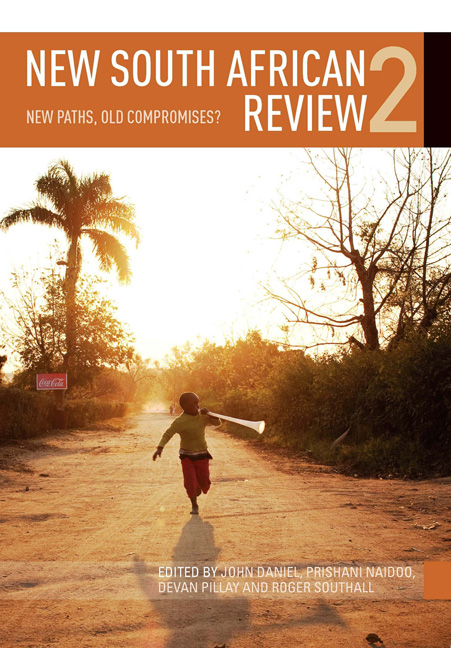Book contents
- Frontmatter
- Contents
- Preface
- Introduction: New paths, old (com)promises?
- PART 1 POLITICS AND INTERNATIONAL
- Introduction: The Zuma presidency: The politics of paralysis?
- Chapter 1 The Tripartite Alliance and its discontents: Contesting the ‘National Democratic Revolution’ in the Zuma era
- Chapter 2 The African National Congress and the Zanufication debate
- Chapter 3 Dancing like a monkey: The Democratic Alliance and opposition politics in South Africa
- Chapter 4 Democracy and accountability: Quo Vadis South Africa?
- Chapter 5 Civil society and participatory policy making in South Africa: Gaps and opportunities
- Chapter 6 Bring back Kaiser Matanzima? Communal land, traditional leaders and the politics of nostalgia
- Chapter 7 South Africa and ‘Southern Africa’: What relationship in 2011?
- PART 2 ECONOMY AND SOCIETY
- PART 3 ENVIRONMENT
- PART 4 MEDIA
- Contributors
- Index
Chapter 6 - Bring back Kaiser Matanzima? Communal land, traditional leaders and the politics of nostalgia
from PART 1 - POLITICS AND INTERNATIONAL
Published online by Cambridge University Press: 23 March 2018
- Frontmatter
- Contents
- Preface
- Introduction: New paths, old (com)promises?
- PART 1 POLITICS AND INTERNATIONAL
- Introduction: The Zuma presidency: The politics of paralysis?
- Chapter 1 The Tripartite Alliance and its discontents: Contesting the ‘National Democratic Revolution’ in the Zuma era
- Chapter 2 The African National Congress and the Zanufication debate
- Chapter 3 Dancing like a monkey: The Democratic Alliance and opposition politics in South Africa
- Chapter 4 Democracy and accountability: Quo Vadis South Africa?
- Chapter 5 Civil society and participatory policy making in South Africa: Gaps and opportunities
- Chapter 6 Bring back Kaiser Matanzima? Communal land, traditional leaders and the politics of nostalgia
- Chapter 7 South Africa and ‘Southern Africa’: What relationship in 2011?
- PART 2 ECONOMY AND SOCIETY
- PART 3 ENVIRONMENT
- PART 4 MEDIA
- Contributors
- Index
Summary
Had I known how the ANC would handle the rural question after apartheid I would not have joined the liberation movements in the 1960s, but supported Kaiser Matanzima and his version of development for the Transkei.
(Former PAC activist in Cala, Transkei)We miss the old days, when there was still farming here and we got support from the tribal authority. When it rained the tractors came and ploughed our land. It was easier for us then to plant crops. It was Matanzima who organised that for us, he cared for the rural people
(Elderly woman, Ketani, Transkei)There is always the misunderstanding that the Matanzimas were not popular with the people.
This is untrue, Kaiser Matanzima had a massive following in the Transkei
(Mda Mda, anti-apartheid activist and advisor to King Sabata Dalindyebo, the Thembu paramount)On 10 May 2010, the Constitutional Court of South Africa declared that the Communal Land Rights Act (CLRA), which had been passed in 2004, was unconstitutional and could no longer be implemented in its current form. The court found that inadequate consultation had taken place with communities and provincial structures prior to the adoption of the Act, and that the Act did not fully address tenure insecurity among rural residents, specifically single women. It was also found that the way the notion of ‘community’ was used in the Act was problematic because it potentially reproduced apartheid-style tribal authorities as ‘new communities’, placing too much control of land in the hands of existing traditional leaders. In fact, part of the case against the state was based on the assertion that CLRA, together with the Traditional Leadership Governance Framework Act of 2003 and a proposed new law that expands the role of traditional courts in law enforcement, would effectively create a fourth tribal tier in the judicial system that was at odds with the democratic constitution of the country. In ruling on the CLRA matter Justice Ngcobo disagreed with this assertion, but felt that the Act made it too easy for the old tribal authorities of the Bantustan era to reconstitute themselves through the legislation. In response, the incumbent minister of land affairs, Gugile Nkwinti, said that his department would not contest the judgment and would revisit the law (SABC News, 10 May 2010).
- Type
- Chapter
- Information
- New South African Review 2New paths, old compromises?, pp. 119 - 141Publisher: Wits University PressPrint publication year: 2012



